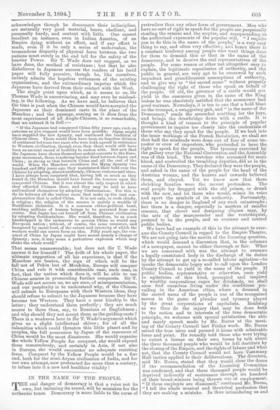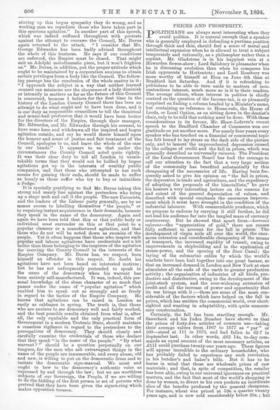IN THE NAME OF THE PEOPLE.
MILE real danger of democracy is that a voice not its _IL own, but imitating its sound, will be mistaken for the authentic tones. Democracy is more liable to the curse of pretenders than any other form of government. Men who have no sort of right to speak for the people are perpetually stealing the ermine and the sceptre, and masquerading as the authorised exponents of the popular will. "I require you to do this in the name of the people," is a very easy thing to say, and often very effective ; and hence there ;s a constant tendency among people who want things done for them to demand this or that in the name of the democracy, and to deceive the real representatives of the people. For some reason or other not altogether easy to explain, the legitimate repositories of authority, and the public in general, are very apt to be overawed by such impudent and grandiloquent assumptions of authority, and to give way to "the sacred name" without properly challenging the right of those who speak on behalf of the people. Of old, the governor of a castle would not yield to the summons given in the name of the King unless he was absolutely satisfied that the summoner had good warrant. Nowadays, it is ten to one that a bold blast on the trumpet, a swaggering gait, and "in the name of the Democracy," sends the seneschal scuttling for the keys, and brings the drawbridge down with a rattle. It is thought a kind of treason to the principle of popular government to inquire too closely into the credentials of those who say they speak for the people. If we look into the inner workings of the French Revolution, we shall see that half the misdeeds were done out of fear of some im- postor or crew of impostors, who pretended to have the right to speak for the people. The tyranny exercised by the gallery over the National Convention and the Assembly was of this kind. The wretches who screamed for more blood, and controlled the trembling deputies, did so in the name of the Democracy. They declared they were the people, and asked in the name of the people for the head of the Austrian woman, and the knaves and cowards believed them, and obeyed. Yet we know now that these shrieking fanatics were the merest pretenders. The real people lay drugged with the old poison, or drunk with the new, and let those who would, mimic its voice and sport the symbols of its authority. Fortunately, there is no danger in England of any such catastrophe; but there is a danger, especially in matters of smaller concern, that clever and designing cliques may, by the arts of the masquerader and the ventriloquist, pretend to be the people, and so overawe and control public bodies. We have had an example of this in the attempt to over- awe the County Council in regard to the Empire Theatre. We are not going into the merits of the licensing question, -which would demand a discussion that, in the columns of a newspaper, cannot be either thorough or fair. What we are concerned with was the attempt to overawe a legally constituted body in the discharge of its duties by the attempt to get up a so-called labour agitation—to invoke the democratic bogey and to call upon the London County Council to yield in the name of the people. If public bodies, representative or otherwise, once yield to agitations of this kind, prompted and inspired by wealthy corporations eager for dividends, we shall soon find ourselves living under the conditions pre- vailing in the American cities, where a demand in the sacred name of the people is one of the recognised moves in the game of plunder and tyranny played by the great corporations of capitalists. Realising as we thus do the injury that may be done both to the nation and to interests of the true democratic principle, we welcome with special satisfaction the able and manly speech made by Mr. Burns at the meet- ing of the County Council last Friday week. Mr. Burns seized the true issue and pressed it home with admirable force and point. He mum* told those who were trying to extort a license on their own terms by talk about the three thousand people who would be left destitute by the closing of the Empire, and the rights of labour and what not, that the County Council would not have Tammany Hall tactics applied to their deliberations. The directors, said Mr. Burns, stated that they would close the doors if the recommendation of the Licensing Committee was confirmed, and that three thousand people would be deprived indirectly of sustenance through six hundred of their bread-winners being thrown out of employment. "If these employs are dismissed," continued Mr. Burns, "I tell the whole musical and theatrical profession that they are making a mistake. In thus intimidating us and stirring up this bogus sympathy they do wrong, and as working men we repudiate those who have taken part in this spurious agitation." In another part of this speech, which was indeed suffused throughout with protests against the attempt to overawe the Council, Mr. Burns again returned to the attack. "I consider that Mr. George Edwardes has been badly advised throughout the whole of this business. He says if our conditions are enforced, the Empire must be closed. That might suit an Adelphi melodramatic piece, but it won't frighten us." Mr. Burns, in addition, put the proper attitude which ought to be maintained by a corporation anxious to obtain certain privileges from a body like the Council. The follow- ing passage has the conclusion of the whole matter in it : "I approach the subject in a, way that neither learned counsel can minimise nor the eloquence of a lady diminish or intensify in matters as far as the future of this Council is concerned, because I believe for the first time in the history of the London County Council there has been an attempt to do what ought not to have been done, and it is our duty as responsible councillors to tell the theatrical and music-hall profession that it would have been better for the directors of the Empire, through their manager, Mr. Edwardes, and Mr. Edwardes through his counsel, to have come here and withdrawn all the inspired and bogus agitation outside, and say he would throw himself upon the honour and sense of justice and fair treatment of the Council, apologise to us, and leave the whole of the case in our hands." It appears to us that under the circumstances the County Council acted quite rightly. It was their clear duty to tell all London in unmis- takable terms that they would not be bullied by bogus agitations got up in the interests of wealthy public companies, and that those who attempted to use such means for gaining their ends, should be made to suffer as keenly as those surer who try to buy or intimidate a Judge.
It is specially gratifying to find Mr. Burns taking this strong and manly line against the pretenders who bring up a stage mob and call it the people. The new Unionists, and the leaders of the Labour party generally, are by no meccas averse to labelling themselves "the people," or to requiring instant acquiescence in their demands, because they speak in the name of the democracy. Again and again we have been told that this or that public body or individual muse surrender on this or that point to a popular clamour or a manufactured agitation, and that those who do not will be noted down as enemies of the people. Yet it often happen.s that those who inspire such popular and labour agitations have credentials not a bit better than those belonging to the inspirers of the agitation for coercing the County Council in the interests of the Empire Company. Mr. Burns has, we suspect, been himself an offender in this respect. No doubt his agitations have not been based on interested motives ; but he has not 'infrequently pretended to speak in the name of the democracy when his warrant has been entirely self-manufactured. It was, indeed, this per- sonal knowledge of the sham character of so much that passes under the name of "popular agitation" which enabled him to speak out so strongly and so freely in regard to the tactics of the Empire Company. He knows that agitations can be raised in London as easily as cabbages in spring. The truth is, that those who are anxious to see democracy well and fairly worked, and the best possible results obtained from what is, after all, the only equitable and the only practical form of Government in a modern Teutonic State, should maintain a ceaseless vigilance in regard to the pretenders to the prerogatives of democracy. They should closely and carefully examine the credentials of those who declare that they speak " in the name of the people." "By what warrant ? " should be a question perpetually on our tongues, for the men who ask extravagant things in the name of the people are innumerable, and every abuse, old and new, is willing to put on the democratic dress and to imitate the democratic sign-manual. We must and ought to bow to the democracy's authentic voice as expressed by and through the law ; but we are worthless subjects of our Sovereign, the People, if we are willing to do the bidding of the first person or set of persons who pretend that they have been given the signet-ring which makes opposition treason.



















































 Previous page
Previous page